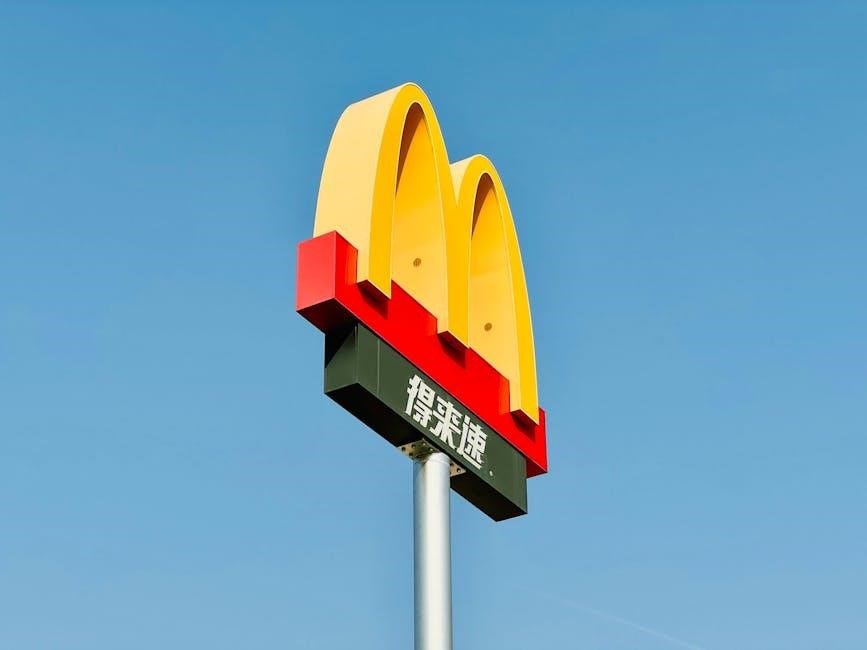Anna Qu’s memoir, Made in China, offers a poignant exploration of labor, identity, and family dynamics through her experiences as a Chinese immigrant in New York.
Overview of the Memoir
Made in China: A Memoir of Love and Labor by Anna Qu is a powerful and poignant account of her childhood as a Chinese immigrant in New York. The memoir recounts her experiences growing up in Queens, where she was forced to work in her family’s garment factory and endured harsh treatment at home. It explores themes of labor, identity, and intergenerational trauma, offering a raw portrayal of immigrant life. Qu’s journey from exploitation to independence highlights her resilience and determination to break free from oppressive circumstances. The book delves into the complexities of mother-daughter relationships and the struggles of balancing cultural heritage with American aspirations, making it a compelling narrative of survival and self-discovery.
Significance of the Title “Made in China”

The title Made in China carries deep symbolic weight, reflecting Anna Qu’s dual identity as both a product of her Chinese heritage and her American upbringing. It underscores the literal and metaphorical “manufacturing” of her life—shaped by the sweatshop labor of her family’s garment factory and the cultural expectations imposed upon her. The phrase, often associated with mass production, mirrors her feelings of being treated as a commodity rather than an individual. It also highlights the broader immigrant experience, where personal value is often tied to labor and sacrifice. Through this title, Qu challenges notions of identity, belonging, and self-worth, making it a fitting encapsulation of her narrative’s themes.

Background of Anna Qu
Anna Qu, a Chinese immigrant, migrated to the United States with her family, enduring a challenging childhood marked by labor in her family’s garment factory and cultural adaptation.
Early Life in China
Anna Qu was born in Wenzhou, China, where her early life was marked by separation when her mother left for America, leaving her with grandparents. This abandonment shaped her identity, fostering resilience and a deep connection to her heritage. Her formative years in China were defined by cultural traditions and familial expectations, which later clashed with her American experiences. The absence of her mother during these years created a void, influencing her perspective on family and belonging. These early experiences laid the foundation for her journey as an immigrant, grappling with dual identities and intergenerational trauma. Qu’s early life in China remains a pivotal chapter in her story, reflecting the sacrifices and challenges faced by many immigrant families.
Immigration to the United States
Anna Qu’s journey to the United States marked a turning point in her life, filled with both hope and struggle. Reuniting with her mother in America exposed her to a new world vastly different from her childhood in China. The transition was fraught with cultural and linguistic challenges, as she navigated her identity between two worlds. Her mother’s expectations of assimilation clashed with Anna’s desire to hold onto her heritage, creating tension within their relationship. This period set the stage for her experiences in Queens, where she would face labor exploitation and family conflict. Immigration not only reshaped her environment but also deepened her resilience, ultimately inspiring her to seek independence and redefine her future. This chapter highlights the complexities of immigrant adaptation and the pursuit of a better life.

Anna Qu’s Experiences in Queens
Anna Qu’s time in Queens was marked by labor in her family’s garment factory and a challenging home life, shaping her resilience and informing her memoir.
Working in the Family Garment Factory
Anna Qu’s experiences in the family garment factory in Queens were central to her formative years. As a teenager, she was tasked with trimming loose threads off sleeves, a duty that underscored the harsh realities of labor in a sweatshop environment. The factory, owned by her parents, became a space where her resilience was tested daily. Despite the physical and emotional toll, this work instilled in her a strong work ethic and a determination to seek a different future. The factory environment, marked by long hours and minimal pay, reflects the broader challenges faced by immigrant workers in the garment industry. These experiences are vividly recounted in her memoir, offering a raw glimpse into the sacrifices and struggles of immigrant life;
Life at Home and Treatment by Her Mother
Anna Qu’s life at home was marked by strict discipline and emotional distance from her mother. She was often treated as a maid, expected to perform household chores without recognition. Her mother’s harshness extended to punishing her for studying at night, reflecting a rigid adherence to traditional values. The tension between Anna’s desire to assimilate into American culture and her mother’s insistence on preserving Chinese identity created a fraught relationship. This dynamic, rooted in intergenerational trauma, shaped Anna’s resilience and determination to forge her own path. The emotional toll of these experiences is poignantly captured in her memoir, offering insight into the complexities of immigrant family dynamics. Her mother’s actions, though well-intentioned, left lasting scars that Anna would grapple with for years.
The Conflict with Her Mother
Anna Qu’s relationship with her mother was fraught with tension, marked by forced labor, harsh punishments, and emotional strain, culminating in her calling child services, a pivotal act with lasting consequences.
Forced Labor and Punishment
Anna Qu’s childhood was marked by relentless labor in her family’s garment factory in Queens, where she was subjected to grueling work conditions. Her mother, intent on teaching her the value of labor, enforced strict discipline, often through harsh punishments. Anna was treated as a maid at home, forced to perform chores and endure physical and emotional abuse. Her desire to study and escape the cycle of exploitation led to further conflict, as her mother saw education as a distraction from the family business. This toxic environment shaped Anna’s resilience and determination to break free from her oppressive circumstances.
Calling Child Services and Its Consequences
Desperate to escape her oppressive home life, Anna Qu made the bold decision to contact child services about her mother’s abusive behavior. This act of defiance had far-reaching consequences, altering the dynamics of her family and setting her on a path to independence. The intervention brought temporary relief but also intensified the emotional turmoil within her household. Anna’s decision to seek help outside the family marked a turning point in her journey, highlighting the complexities of seeking justice in a system that often struggles to understand cultural nuances. This pivotal moment shaped her resolve to carve out a future beyond the shadows of her traumatic childhood.

Themes of the Memoir
The memoir delves into themes of resilience, cultural identity, and the immigrant struggle, highlighting the complexities of navigating a new world while preserving one’s heritage.
Labor and Self-Worth
Labor is a central theme in Made in China, as Anna Qu recounts her grueling experiences working in her family’s garment factory in Queens. From a young age, she was forced to toil in sweatshop conditions, often for long hours with little rest. Her mother, driven by a desire to instill discipline, treated Anna more like a laborer than a daughter. The memoir vividly portrays how Anna’s self-worth became deeply tied to her productivity, as her mother repeatedly emphasized that hard work was the only path to success. However, this relentless focus on labor also led to emotional and psychological toll, as Anna struggled to find value beyond her contributions to the family business. Through her story, Qu highlights the complex interplay between labor, identity, and resilience in immigrant experiences. Her journey ultimately reveals how labor can both empower and oppress, shaping one’s sense of self in profound ways.
Immigrant Identity and Cultural Struggles
Anna Qu’s memoir delves into the intricate struggles of navigating dual identities as a Chinese immigrant in America. Her experiences reflect the tension between preserving cultural heritage and adapting to a new world; Growing up, Anna faced her mother’s rigid expectations of conformity to Chinese values, which often clashed with her desire to assimilate into American culture. The memoir vividly captures her internal conflict, as she grappled with feelings of alienation and disconnection from both her Chinese roots and her American surroundings. Through her story, Qu sheds light on the universal immigrant experience of balancing tradition with the pursuit of belonging. Her journey underscores the resilience required to forge a sense of self amidst cultural dislocation. This theme resonates deeply with readers, offering a raw and relatable portrayal of identity formation.
Family Dynamics and Intergenerational Trauma
Anna Qu’s memoir vividly portrays the strained family dynamics and intergenerational trauma that shaped her upbringing. Her mother’s strict, often harsh behavior—forcing Anna to work in the family garment factory and punishing her for studying—reflects a cycle of pain rooted in her mother’s own traumatic past. The emotional distance and lack of nurturing in their relationship highlight the generational scars of immigration and cultural dislocation. Anna’s decision to call child services marked both a desperate attempt to escape her oppressive home life and a pivotal moment in confronting the inherited trauma; The memoir offers a raw exploration of how family legacies of suffering can both bind and divide, resonating with readers who have experienced similar struggles within immigrant households. Qu’s story illustrates the complex interplay of love, duty, and hurt that often defines these relationships.
Anna Qu’s Journey to Independence
Anna Qu’s path to independence began with education, offering her escape from oppressive family dynamics and enabling her to forge a new identity beyond her traumatic upbringing.
Education as a Path to Freedom
Education became Anna Qu’s lifeline, providing her with the tools to break free from her oppressive home environment. Despite her mother’s disapproval and the demands of working in the family garment factory, Anna found solace in her studies. She pursued higher education, which not only offered her a sense of accomplishment but also a way to redefine her identity. Through her academic journey, Anna gained the confidence and independence necessary to distance herself from the toxic dynamics of her family life. Her resilience and determination to succeed underscored the transformative power of education in her quest for self-liberation and a brighter future.
Breaking Free from Toxic Family Ties
Anna Qu’s journey to independence was marked by her courage to confront and eventually break free from the toxic dynamics with her mother. Her decision to call child services was a pivotal moment, leading to consequences that reshaped her life. Despite her mother’s anger and emotional manipulation, Anna found the strength to distance herself from the oppressive environment. This liberation allowed her to redefine her identity and pursue a future free from the suffocating grasp of her family’s toxic patterns. The scars of her upbringing remained, but they also fueled her determination to forge a path of self-reliance and independence, ultimately emerging as a testament to her resilience.
Reception of the Memoir
Anna Qu’s memoir received widespread critical acclaim, hailed as a powerful exploration of labor and identity. It became a bestseller, resonating deeply with immigrant communities worldwide.

Critical Acclaim and Reviews
Anna Qu’s Made in China has garnered significant critical acclaim for its unflinching portrayal of labor, identity, and family dynamics. Reviewers praise Qu’s raw, evocative prose, which captures the complexities of immigrant life. The New York Times Book Review named it an Editors’ Choice, highlighting its profound exploration of intergenerational trauma. Critics like Megan Vered of The Rumpus commend Qu’s ability to redefine the immigrant narrative, offering a gritty yet hopeful perspective. The memoir has also been lauded for its nuanced depiction of mother-daughter relationships, resonating deeply with readers grappling with similar experiences. Its impact extends beyond literature, sparking essential conversations about labor rights and cultural identity.
Impact on Readers and the Immigrant Community
Anna Qu’s Made in China has deeply resonated with readers, particularly within the immigrant community, by validating their struggles and amplifying their voices. The memoir’s raw honesty about labor exploitation, cultural identity, and intergenerational trauma has created a sense of solidarity among readers who see their own experiences reflected. Many have praised the book for its ability to spark conversations about systemic issues faced by immigrants, such as exploitation in sweatshops and the emotional toll of assimilation. By sharing her story, Qu has empowered others to confront their own traumas and advocate for change. The memoir has become a vital resource for understanding the complexities of immigrant life and fostering empathy across cultural divides.

Structure and Style of the Memoir
Anna Qu’s memoir is structured with vivid imagery and raw honesty, blending personal anecdotes with universal themes of identity, labor, and resilience, creating a deeply reflective narrative.
Narrative Techniques and Tone
Anna Qu employs a direct and unflinching narrative style, weaving together vivid descriptions of her experiences in the garment factory and at home. Her tone is both bitter and aching, reflecting the emotional weight of her childhood struggles. Through detailed imagery, she recounts trimming loose threads in the sweatshop, emphasizing the monotony and exploitation. The memoir’s voice is raw and introspective, allowing readers to connect deeply with her pain and resilience. Qu’s use of specific, evocative language creates a haunting yet powerful portrait of her journey, blending personal trauma with broader themes of labor and identity. This narrative approach ensures her story is both deeply personal and universally relatable.
Balancing Personal and Universal Themes
Anna Qu masterfully intertwines her personal struggles with universal themes, creating a memoir that resonates deeply with readers. Her story of labor exploitation, cultural identity, and familial trauma transcends individual experience, speaking to broader immigrant narratives. By sharing her specific journey, Qu addresses universal questions about self-worth, intergenerational trauma, and the complexities of mother-daughter relationships. Her vivid recounting of life in the sweatshop and at home bridges the gap between personal pain and collective understanding. This balance allows readers to connect with her unique story while reflecting on the shared human struggles of resilience, identity, and the pursuit of freedom. Qu’s ability to merge the intimate with the universal makes Made in China both deeply personal and broadly impactful.

The PDF Version of “Made in China”
The memoir is available in PDF format, along with epub, ensuring accessibility for readers across various digital platforms and devices.
Availability and Formats
Made in China: A Memoir of Love and Labor is available in various digital formats, including PDF, epub, and Microsoft Word. Readers can access the memoir through platforms like Amazon Kindle, where they can download the file and transfer it to their devices. Tools such as CloudConvert facilitate format conversions, ensuring compatibility with different e-readers. The PDF version is particularly popular for its readability and ease of sharing. Additionally, the memoir can be accessed through libraries and online retailers, offering flexibility for readers. This accessibility ensures that Anna Qu’s powerful story reaches a wide audience, allowing readers to engage with her journey of resilience and self-discovery in a format that suits their preferences.
How to Access the Memoir Digitally

Accessing Anna Qu’s Made in China digitally is straightforward. Readers can purchase the PDF or epub versions from major retailers like Amazon or Barnes & Noble. For Kindle users, downloading the file and sending it to their device via email or the Kindle app is a common method. Additionally, platforms like CloudConvert can convert files to preferred formats. Some libraries offer digital lending options, allowing borrowers to access the memoir temporarily. Ensuring compatibility with e-readers or tablets is essential for an optimal reading experience. This ease of access makes Qu’s compelling narrative widely available, enabling readers to explore her journey of resilience and self-discovery at their convenience.
Made in China by Anna Qu is a powerful memoir that sheds light on the struggles of immigrant life, labor, and identity, leaving a lasting impact on readers.
Legacy of Anna Qu’s Story
Anna Qu’s memoir, Made in China, leaves a profound legacy by giving voice to the often-silent struggles of immigrant families and their intergenerational trauma. Her story challenges the conventional narratives of immigrant success,Instead, it presents a raw and unfiltered account of resilience, self-discovery, and the cost of pursuing a better life. By sharing her experiences, Qu not only validates the emotions of many immigrants but also sparks crucial conversations about labor exploitation, cultural identity, and the complexities of family relationships. Her journey from a sweatshop in Queens to academic and professional achievements serves as a testament to the strength of the human spirit and the enduring impact of one’s origins on their destiny.

Final Thoughts on the Memoir’s Importance
Made in China stands as a vital contribution to the literary landscape, offering a searingly honest portrayal of immigrant life. Anna Qu’s story is not just a personal narrative but a universal one, resonating with anyone who has grappled with identity, belonging, and the weight of family expectations. The memoir’s unflinching examination of labor exploitation, cultural identity, and intergenerational trauma provides a necessary perspective on the immigrant experience. By confronting these themes with clarity and courage, Qu’s work challenges readers to reflect on their own lives and societal structures. Her story is a powerful reminder of the resilience required to forge one’s path in a world often defined by others, leaving a lasting impact on all who encounter it.
